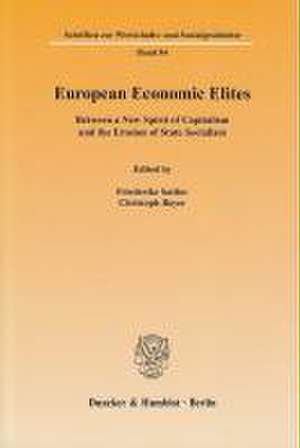European Economic Elites: Schriften zur Wirtschafts- und Sozialgeschichte, cartea 84
Editat de Friederike Sattler, Christoph Boyeren Limba Engleză Paperback – 31 oct 2009
Din seria Schriften zur Wirtschafts- und Sozialgeschichte
- 14%
 Preț: 982.32 lei
Preț: 982.32 lei -
 Preț: 340.32 lei
Preț: 340.32 lei -
 Preț: 283.68 lei
Preț: 283.68 lei - 5%
 Preț: 858.81 lei
Preț: 858.81 lei - 11%
 Preț: 463.86 lei
Preț: 463.86 lei -
 Preț: 616.27 lei
Preț: 616.27 lei - 11%
 Preț: 828.75 lei
Preț: 828.75 lei - 11%
 Preț: 566.55 lei
Preț: 566.55 lei - 11%
 Preț: 610.14 lei
Preț: 610.14 lei - 11%
 Preț: 865.33 lei
Preț: 865.33 lei - 11%
 Preț: 645.28 lei
Preț: 645.28 lei - 11%
 Preț: 575.64 lei
Preț: 575.64 lei - 11%
 Preț: 702.54 lei
Preț: 702.54 lei - 11%
 Preț: 592.26 lei
Preț: 592.26 lei - 14%
 Preț: 1011.59 lei
Preț: 1011.59 lei - 14%
 Preț: 1028.19 lei
Preț: 1028.19 lei - 11%
 Preț: 596.61 lei
Preț: 596.61 lei -
 Preț: 516.81 lei
Preț: 516.81 lei - 11%
 Preț: 435.24 lei
Preț: 435.24 lei - 11%
 Preț: 626.33 lei
Preț: 626.33 lei - 11%
 Preț: 923.97 lei
Preț: 923.97 lei - 11%
 Preț: 906.20 lei
Preț: 906.20 lei - 11%
 Preț: 555.11 lei
Preț: 555.11 lei - 11%
 Preț: 540.11 lei
Preț: 540.11 lei
Preț: 496.89 lei
Preț vechi: 613.45 lei
-19% Nou
Puncte Express: 745
Preț estimativ în valută:
95.11€ • 103.35$ • 79.94£
95.11€ • 103.35$ • 79.94£
Carte indisponibilă temporar
Doresc să fiu notificat când acest titlu va fi disponibil:
Se trimite...
Preluare comenzi: 021 569.72.76
Specificații
ISBN-13: 9783428131815
ISBN-10: 3428131819
Pagini: 594
Ilustrații: Tab., Abb.; 594 S.
Dimensiuni: 159 x 238 x 30 mm
Greutate: 0 kg
Editura: Duncker & Humblot GmbH
Seria Schriften zur Wirtschafts- und Sozialgeschichte
ISBN-10: 3428131819
Pagini: 594
Ilustrații: Tab., Abb.; 594 S.
Dimensiuni: 159 x 238 x 30 mm
Greutate: 0 kg
Editura: Duncker & Humblot GmbH
Seria Schriften zur Wirtschafts- und Sozialgeschichte
Cuprins
Inhalt: In Lieu of an Introduction: Big Structures, Large Processes and Huge Comparisons - A Frame of Interpretation: F. Sattler / C. Boyer, European Economic Elites between a New Spirit of Capitalism and the Erosion of State Socialism - Economic Elites in the Twentieth Century: Overviews from Western and Eastern Perspectives: D. Ziegler, Economic Elites in the Twentieth Century: Germany and its Western Neighbours - Á. Pogány, Hungarian Economic Elites in the Twentieth Century - Formations and Profiles in Western Europe: Between Cohesion and Fragmentation: H. Joly, Die bemerkenswerte Persistenz der staatlichen grands corps bei der Rekrutierung der Wirtschaftseliten in Frankreich - F. Lavista, Business Elites in Italy and the Failure of the National Planning Policies as a Vision of Development - M. Loff, Elites and Economic Modernization in Portugal (1945-1995): Authoritarianism, Revolution and Liberalism - T. David / S. Ginalski / F. Rebmann / G. Schnyder, The Swiss Business Elite between 1980-2000: Declining Cohesion, Changing Educational Profile and Growing Internationalization - Formations and Profiles in Eastern Europe: Between Erosion and Transformation: Z. Varga, The Agrarian Elite in Hungary before and after the Political Transition - G. Lengyel, Social Factors Conditioning the Recruitment of the Hungarian Economic Elite at the End of the 1990s - M. Boldorf, Elitentausch? Die betrieblichen Führungskräfte in Ostdeutschland seit den 1980er Jahren - L. Macáková / E. Kubu, Transformation of Economic Elites after the Fall of Communism in Czechoslovakia - Challenges and Responses: Strategies during the Third Industrial Revolution: M. Schramm, Wirtschaftseliten und Wissenstransfer in der DDR und Bundesrepublik Deutschland 1949-1990: Beispiele aus den "wissensbasierten" Industrien - K. C. Priemel, Dispiriting Decade. Structural Crisis, Managerial Failure, and the Fall of the House of Flick, 1975-1985 - C. Dirninger, Der politische Unternehmer. Ein österreichisches Beispiel - T. Gulbrandsen, Private Business Lobbying in a Corporatist Society. The Case of Norway - Change of Values, Interpretations and Legitimations: P. Hübner, "Sozialistische Manager" und betriebliche Sozialpolitik in der DDR und Polen. Anmerkungen zu einem Vergleich - K. Golata, The Problems of a Business Elites' Image and Reputation. The Example of Poland - A. Vonderau, Enterprising self. Neue soziale Differenzierung und kulturelle Selbstdeutungen der Wirtschaftselite in Litauen - On the Way towards a Transnational Business Elite?: M. Leimgruber, Bringing Private Insurance Back In. The Geneva Association as a Transnational Insurance Think Tank (1973-2000s) - L. Sklair, The Transnational Capitalist Class. Theory and Empirical Research
Recenzii
"Der Band ist unverzichtbar für alle, die sich für die europäischen Eliten nach 1945 im Allgemeinen und für die Wirtschaftseliten im Besonderen interessieren; seine beiden großen Vorzüge sind die gesamteuropäische Perspektive und der großangelegte Syntheseversuch in der Einleitung der Herausgeber, und er fordert zu einer präziseren Bestimmung der wirtschafts- und sozialhistorischen Zäsuren nach 1945 auf. Das ist das Beste, was sich über eine zeitgeschichtliche Untersuchung sagen lässt." Morten Reitmayer, in: H-Soz-u-Kult, 18.05.2010"[...] Insgesamt sticht der Band durch die Vielseitigkeit seiner Argumente und Verknüpfungen positiv heraus und ist vor allem für Politologen, Ökonomen und Soziologen geeignet." Björn Wagner, in: Portal für Politikwissenschaft, 09.06.2010"Es ist [...] nicht die Regel, dass es gelingt, die Ergebnisse großer internationaler Konferenzen so zusammenzufassen, dass die Studien ausgeglichen und aus Sicht der Buchstruktur auch kohärent wirken." Jakub Rákosník, in: Bohemia Band 51 (2011)
